| Thursday, September 11, 2003 |  |
|
|
|
 There's a secret to how to live a relaxed and secure life. It is unfortunately one I haven't mastered very well myself, but I do have an idea of what it is about. It is simply that to do many things in life without being stressed about them, you need to get them out of your mind and embedded into a system which will run on automatic, even when you aren't paying attention. There's a secret to how to live a relaxed and secure life. It is unfortunately one I haven't mastered very well myself, but I do have an idea of what it is about. It is simply that to do many things in life without being stressed about them, you need to get them out of your mind and embedded into a system which will run on automatic, even when you aren't paying attention.
This applies to money making, and it applies to organization.
As I've mentioned before, most people aren't actually making a living by doing good work and being duly rewarded for it. They do it by having a system in place that pays them money. The low level way of doing that is having a job. You show up every day, appear to be doing what looks like a job, and you get a paycheck every two weeks. More successful people have set up other kinds of systems. The most successful and leisurely way of making a living is to have set up a system that pays you each month forever, without requiring that you show up for anything, or do anything. That is called residual income. You happen to have invested some money wisely, or you've patented something or created something that people pay you royalties for. Or you happen to have gotten in early on some multi-level marketing scheme and have thousands of people paying you percentages. Or you have this website that sells things while you sleep. All of those are systems. You've set up something that will work automatically, with as little involvement from you as possible. The more involvement you have, and the more it depends on your daily work, the more you're a slave to work. And the more it has nothing to do with your actual daily work, the more you have succeeded and freed yourself. The more you can pass the buck on to somebody else who will do actual work, the better. In a capitalistic society, the ultimate accomplishment is to have a lot of capital which you can lend to others, and which they're forced to bring back to you with interest, without you being involved in how.
But it isn't just about passing the buck and living off of the work of others. It is also simply that it is generally a good idea to figure out how to do the most with the least possible effort.
That might be more obvious when applied to organization. Organization is generally about setting up a system that best deals with the stuff that is there to do, requiring the least possible brains to manage it every day. If there's a job to do, and a bunch of people to do it, you don't want to every day try to figure out how to do everything all over again. You'll make up an outline of how things will flow. Orders come in here, then they go over there, and these people here pack things in boxes, and those over there keep track of the numbers, and somebody answers the phone, etc. You set up certain posts, certain hats that somebody can wear, and some lines between them. And then, even if the posts are manned by half-asleep minimum wage employees, things are likely to get done. There's a system in place, and the system keeps things running, somewhat on automatic.
Same thing with my personal organization. Bills go into this basket, letters to answer go into this one, and there are file folders for everything, and a routine for doing things. A good system would require minimum attention, and one doesn't have to be very awake to carry it out. You just follow the system. A well designed personal organization system will take all the things to keep track of out of your mind, and down on pieces of paper or lists or in computer programs, or whatever it is that works. And you can just relax and concern yourself with more interesting things, trusting that the system is keeping track of things for you.
It is almost like it is a step in human evolution. If we're smart enough, we can potentially free ourselves from repetitive work and unnecessary stress. We figure things out well once, and then hand most of the job over to a system of some kind. And if it at some point is found not to work so well, we change the system. But we'd spend most of our consciousness on the things in life we actually enjoy spending it on, rather than on solving the same problems over and over again. So, maybe, if we successfully offload more of our lives to automation, we might pass on to another level of evolution.
I don't know. That's an idea. I can't say that I typically find rich MLM people or super neat people terribly evolved or worthy of admiration. But there's something to it somewhere. Some kind of message that we'll only survive if we can manage to offload bigger chunks of our lives into automated systems. Or there just isn't enough hours in the day to making a living and keep track of all you want to keep track of. A lot of us are drowning in things to do, and don't have a chance of doing it all the hard way.
As I said, I haven't really figured this out in some key areas of my life. I tend to end up doing most things the hard way. I work for a living, and the moment I stop or slow down, my checkbook is empty. And my desk is crowded with paper. I don't always remember to pay bills, and I often can't find where I put certain papers.
I do notice that some people do these things fairly naturally and effortlessly. Their desks are clear, and when something needs doing, they don't just volunteer to do it. They typically will find the way of doing things that requires as little involvement of their time and resources as possible. I need to study how that works.
Doing more with less. That's what I think I'm talking about. The right system can leverage your energy to you get the most done of what needs to be done, using the least possible resources. Which then can be free for other endeavors.
[ Organization | 2003-09-11 17:19 | | PermaLink ] More >
|
|
| Monday, September 1, 2003 |  |
|
|
|
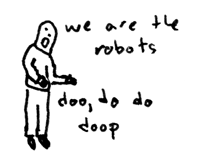 A fellow named Marshall Brain wrote a couple of interesting articles, Robotic Nation and Robotic Freedom. Essentially he points out that it is pretty inevitable that in a few years a lot of jobs will be done by robots. Particularly minimum wage low level jobs, like clerks at Walmart, the people at the counter at McDonalds, etc. So, a lot of people will become unemployed, because their jobs can be done without humans, or with much fewer humans. But the people who own those companies will make the same or more money. Wealth gets amassed into fewer hands and large masses of people will have no chance of playing in that game. And the author then tries to come up with some creative scenarios of how wealth might become more distributed. A fellow named Marshall Brain wrote a couple of interesting articles, Robotic Nation and Robotic Freedom. Essentially he points out that it is pretty inevitable that in a few years a lot of jobs will be done by robots. Particularly minimum wage low level jobs, like clerks at Walmart, the people at the counter at McDonalds, etc. So, a lot of people will become unemployed, because their jobs can be done without humans, or with much fewer humans. But the people who own those companies will make the same or more money. Wealth gets amassed into fewer hands and large masses of people will have no chance of playing in that game. And the author then tries to come up with some creative scenarios of how wealth might become more distributed.
Many good points in those articles, and some good ideas too, although probably not all workable. I'd insist that there are some fundamental problems in our economic system which would need to be solved, and which won't be solved by creative ways of paying people money so they can keep being consumers. The current system is rigged towards amassing money for large corporations and banks, and little sub-schemes aren't going to change that.
The robot problem indeed points out some of those design flaws in the system. Indeed, if a piece of work could be done well by robots instead of humans for 1/2 the price, few corporations will hesitate to make that choice. So, take that a bit further and imagine that at some point most work could suddenly be done by robots. The "rational" decisions for a board of directors, if there's a cheaper and more efficient alternative, will be to fire everybody, except for a few managers or designers or whatever would still be needed. Taken to its full conclusion, we end up with just managers, board members, business owners, investors, and we don't need everybody else. Automated factories can ultimately produce everything, and smart robots can do all manual work.
But hey, where's then the future we were promised? If most things end up being done by automation, we'd expect to be able to live lives of leisure, pursuing purely artistic or philosophic endeavors. Growing orchids, painting, traveling, studying ancient languages. If machines could produce in abundance everything we need, there would be no great reason why we shouldn't. Then why isn't it going in that direction?
Despite announcements of us living in an information economy, we're really still living in an economic system designed for the industrial revolution, meant to centralize the production power, and the capital needed to finance it. Under such a system, ubiquitous automation would mean that almost everybody's unemployed and that the owners of the production apparatus would be incredibly wealthy.
That is not going to happen, just for the reason that the capitalistic system doesn't work without most of us being consumers. I.e. we need to be able to pay for whatever is produced. The wealthy corporate owners enjoy being very wealthy, but they know full well that it in their best interest to keep most other people in a state of being affluent enough to buy the products that are being produced, but stupid enough to not be able to threaten their position. So they would naturally look towards inventing some more useless jobs to replace the jobs that are automated. Probably they won't create those jobs themselves, but they might persuade a government to increase its budget or start a war or something. Or they might think of ways of making life more complicated so that some new kinds of professions are needed to sort it out.
There's also the entirely more optimistic possibility that the new technology will become inherently liberating for everybody. Just like the Internet tends to flatten out hierarchies and give equal possibilities to a much wider group of people. Robotics, artificial intelligence and nanotech might possibly do that too. There's indeed a trend towards putting the means of production more into the hands of regular people. It won't be all that long before you can have a "printer" in your house which can "print" things that are actually useful. Right now you can buy such a thing for making prototypes, and it will make plastic models of computer design, and it has dropped drastically in price over the last few years. Just like desktop publishing revolutionized publishing, desktop manufacturing will too. Potentially the advantage of huge centralized production facilities will disappear for many purposes. You might be able to produce things just as cheaply in your kitchen. Or maybe, as with desktop publishing and website design, even cheaper on your own than if it were done by a huge corporation.
And maybe, along with all that change, somebody will come up with a new economic system that actually is good enough that it sticks. A system where it actually is a good thing for everybody if something can be produced more efficiently, rather than an unemployment headache.
[ Organization | 2003-09-01 17:03 | | PermaLink ] More >
|
|
| Tuesday, August 12, 2003 |  |
|
|
|
 Now, if we all had sufficiently good information, that whole issue about what to do and how to make a living would just not be a problem. Now, if we all had sufficiently good information, that whole issue about what to do and how to make a living would just not be a problem.
Most of us have something very useful we can do, which is needed somewhere. For that matter, there will usually be somewhere where that which we most love to do is exactly what is needed.
What makes our current economic system work very inefficiently is that we usually don't have good information about what is needed and where, and about who are the best people to deal with. And we don't have a good way of informing others about what we'd like to do, or what we can do.
Oh, there's an overwhelming abundance of information around us, about products and services offered, and opportunities available. But it is not very good information. Most of it is bogus information.
Advertising is mostly bogus information. It tries to make us desire and seek certain products, not based on that we really need them or that they're the best ones available, but based on making us want them, despite that we might not need them, or they aren't really the best.
A free economic market is ideally perfectly fair, and is driven by information. If people consider a certain product or service worthless, the price will drop, and it will no longer be sensible to produce it. If people find a certain product or service very valuable and desirable, the price will go up, which will reward those who produce it, and inspire the production of more of it. Until there is too much of it, where the prices will then drop and things will adjust themselves again. It is a very sensible system of self-organization.
It is unfortunately not completely how it works in real life. Some wrenches have been thrown into the free market, such as the existence of corporations, with corporate veils, and intellectual property right. We have a Monopoly game, essentially, where the biggest rewards go to those who most succeed in grabbing a monopoly in some area, in part by making their product look better than they really are, by paying less for producing them than what is fair, by hiding their corporate structure, by bribing governments to give them special treatment, and generally by hiding or embellishing the truth about how things really are.
Oh, there's still a market there, so market mechanisms can still manage to adjust things, as some of the true information gets shared. The public might discover who consistenly produces bad products, or they might discover who really owns a company, or which public official is working for them, and they might disapprove. The system still tends to be more efficient than a centralized bureacracy.
I suppose the communist system was based on the idea that if we centralize all the information, we can make the best possible decisions about what production power is needed where, and we can do things most efficiently. But the problem is that it ignored all the little pieces of information exchanged between individuals, and it ignored their individual choices, and their need to be motivated by personal accomplishment. And then a top-down hierarchy becomes very inefficient.
No, what we really need is an open network of very well-informed people who make decisions based on what they know. If the information is mostly good, the result will be useful self-organization, despite that not all participants can be expected to make completely rational decisions.
Imagine for a moment that we all had fully functional telepathy. I would know right away when you're lying to me, and I would know right away what you're actually doing, and how you are doing it, and with whom. There would be no point in you trying to tell me anything else, as I could just look in your mind and see the truth. Thus you wouldn't be able to sell me something that wasn't right for me, or which pretended to be something else than it really was.
We'd need some kind of networked telepathy. I don't just need to know the truth about what you're about, I'd need to be able to quickly assess what is *out there*. What is offered and what is needed, in a wide sphere around me.
Currently, if I need something, I might search on the net, look in a newspaper, write about it in my newslog, ask a few people. And quite often I'll find something that fits what I'm looking for. But it is in a very haphazard manner.
Like, right now I have certain skills, certain experience, and certain desires, and I have a need for applying some of these in a way that my life is supported from it. Putting that out to a few hundred people who read this, and networking it a little bit on other sites - that does produce results. It is good to have friends. Quite often, what one is looking for might be found amongst the few dozen or few hundred friends one has. And that's certainly a good thing.
But if we had a good enough information network, be it telepathic or computerized, there could very well be ways that I might access the information shared by thousands or millions of people, and it would be much more likely that I'll find what I'm looking for.
I'm not talking about that I can do a search on keywords in a search engine. I can already do that, and that is great. But it gives me a very small portion of the whole picture.
I'm right now in a city of close to a million people, and of course, amongst those, there will be some people who know a great place where some of my skills will fit in a very mutually advantageous place. But I only know a handful of people here. I'll know more. But most information is well hidden, so it takes a while.
There's plenty to do here, and anywhere on the planet, and there are plenty of people who can do what needs to be done, and plenty of resources to do them with. The only thing in the way is our lack of ability to see all this clearly. We don't have enough good information, or it isn't structured to give a clear picture, or we're not sure we can trust it. Thus we operate based on small personal networks and questionable information from public sources. Where we really could operate at a whole different level if the real information was available.
It is not an impossibly hard problem to solve this. Telepathy would be preferable, but it can also be done through well-structured computerized databases. Large numbers of people who share their knowledge and value judgements about many things. Better ways of expressing needs and offerings in a concise way.
[ Organization | 2003-08-12 04:42 | | PermaLink ] More >
|
|
| Wednesday, June 25, 2003 |  |
|
|
|
Jon Husband quotes from an excellent article by William Gibson (Neuromancer, etc) in NY Times. It is in part reflections on Orwell and 1984 and where we're at today."Elsewhere, driven by the acceleration of computing power and connectivity and the simultaneous development of surveillance systems and tracking technologies, we are approaching a theoretical state of absolute informational transparency, one in which "Orwellian" scrutiny is no longer a strictly hierarchical, top-down activity, but to some extent a democratized one. As individuals steadily lose degrees of privacy, so, too, do corporations and states. Loss of traditional privacies may seem in the short term to be driven by issues of national security, but this may prove in time to have been intrinsic to the nature of ubiquitous information." I think he's right. In the long run the transparency of information will be a democratizing force. And this piece here makes me outright start rubbing my hands in glee:"In the age of the leak and the blog, of evidence extraction and link discovery, truths will either out or be outed, later if not sooner. This is something I would bring to the attention of every diplomat, politician and corporate leader: the future, eventually, will find you out. The future, wielding unimaginable tools of transparency, will have its way with you. In the end, you will be seen to have done that which you did." Heheh. So, you might as well start doing what you ought to be doing right now, rather than what merely looks good on the surface. Because eventually it will all be abundantly clear, and your legacy will be the truth about you, not your corporate brochures or your campaign speeches or your double-speak.
[ Organization | 2003-06-25 16:27 | | PermaLink ] More >
|
|
| Tuesday, June 17, 2003 |  |
|
|
|
David Weinberger:"Here's something blindingly obvious, really just a spin on what has been said elsewhere:
Most (?) ordering schemes apply an externally-devised order to the stuff to be ordered: alphabetic order is not something built into the books on your shelf. Or, in the case of Trevor Bechtel, while the color of a book's binding is clearly part of the book, the idea of ordering them on a shelf by color comes purely from Trevor.
Hyperlinks aren't like that. They build into the page itself its place in the webby universe.
Is there something interesting about this other than it's how web spaces construct themselves?" I'm looking for clues in similar places. Clues for how we might better organize our information world.
Hmm. Hyperlinks show that something is (claimed to be) related to something else. That is a form or organizing of course. But it doesn't sort things, like one can do with a book title or color. Somebody (a search engine spider) has to go and use those links to find ALL the data it can get its, and THEN they can sort things.
But, hm, what if a hyperlink actually were used as part of an ordering scheme? Like, if a document includes a bunch of links that say "This is where I belong". It could link to a certain web resource that would be the central coodination place for a certain time period, a certain geographical location, several different places for organizing topics. Would that work? I'm not sure. Because what if that resource moves or changes a bit, and the link breaks. It would have to somehow be two-way and self-repairing, if we would consider counting on it.
I'd like to be able to ask questions like "How many yellow books do I have in my library?" or "Tell me everything that happened in my life on Thursday the 12th". I'd like the answers to be ready very quickly, a couple of seconds, even if I ask an unusual question. I don't really care whether a program goes and looks through ALL my data bits from the outside to figure out if they fit, or whether all my data bits have reported in by themselves. As long as the answer shows up immediately.
I still dream about a vague as-yet-uninvented storage scheme that will allow you to instantly search on arbitrary criteria, without having to have thought of them much in advance. Some kind of fuzzy quantum computing thing that provides all possible answer to a question at the same time. The moment you say "red" everything red is instantly there, whether anybody dreamt of that before or not. And, no, I'm not just talking about a text search in Google.
[ Organization | 2003-06-17 19:10 | | PermaLink ] More >
|
|
| Wednesday, June 11, 2003 |  |
|
|
|
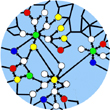 The Identity Commons seeks: The Identity Commons seeks:...to create the world's premier electronic system for individuals and organizations to interact commercially, socially and personally, while providing every entity with control of its information, identity, and relationships consistent with healty communities. It was apparently just discussed at the PlaNetwork Conference, which I'm kicking myself for not going to. See comments from
Jay Fienberg and Mark Canter about "People's DNS". Anyway, looking at the Identity Commons site, there's already some good friends of mine on the list of instigators, but I guess I must have been oblivious about it until now. I went and noted my support for its aims at Venture Collective.
[ Organization | 2003-06-11 03:50 | | PermaLink ] More >
|
|
|
|
Kevin Marks:
"The history of democracies is usually told as a rebellion against an overweening King - George III for America, Louis XVI for France. In England it is King John, in 1215, and the rebellion gave rise to the Magna Carta which constrained the powers of a king, and providing for a separate body (of barons) to enforce it.
Cromwell's rebellion against Charles I is not often portrayed as democratic, though the accession of William & Mary in 1688 after James's restoration was notable for the English Bill of Rights which further constrained the King's power and in effect made Parliament sovereign.
The history of democracy can be seen as successive (and expanding) answers to the questions:
Who gets to vote?
Who gets to speak?
Who gets to set the topic?
With a single sovereign, or a single parliament, control of the latter two is still tricky; legislative agendas, though longer than historically, are still constrained, and the introduction of legislation is more often reserved to government or elected legislators, and more rarely allowed by referendum.
In a deliberative body, elaborate rules are adopted to ensure only one person speaks at a time.
There is an inherent funneling of debate because of these procedures.
Conversely, online there are millions of conversations happening in parallel, topics are introduced daily, and votes are largely spurious.
The challenge is help these conversations to focus, converge and produce action." Indeed. To focus, converge and produce action. If we can accomplish that to a significantly higher degree, there will be no more aristocracies.
[ Organization | 2003-06-11 03:27 | | PermaLink ] More >
|
|
| Thursday, May 29, 2003 |  |
|
|
|
 Yesterday I was watching GIFTING IT: A Burning Embrace of Gift Economy, which is a documentary about the gift economy in effect at BurningMan, which I mentioned here. Somebody said: Yesterday I was watching GIFTING IT: A Burning Embrace of Gift Economy, which is a documentary about the gift economy in effect at BurningMan, which I mentioned here. Somebody said:You could almost say that the definition of community is a place where there's gift giving.
The converse of that would be that if you want to destroy community, a good way of doing it is to turn all gift giving into commercial exchanges. Right. I agree. It is like in a family. Wouldn't work if we had to account for and pay for each act. My baby daughter would have had no money to pay for her upbringing. Lots of little joyful or necessary acts would just have been so much harder if we had had to go out and get financing for them. Likewise in any community of people who aren't just family. What brought them together might well have been a commercial relationship. But what holds them together, and what makes the community useful is all the extra stuff they do together which they didn't necessarily have to do.
Economics is not so much about money as it is about making choices. In gift economies it is all about choices. Communities form when a bunch of people somehow choose to operate together. It is better the more informed their choices are. Taking away the ability to choose, or the ability to choose well, destroys community and is also bad economics.
[ Organization | 2003-05-29 23:31 | | PermaLink ] More >
|
|
| Monday, May 26, 2003 |  |
|
|
|
 From Creative Commons, a feature article about Sal Randolp, a New York-based artist who has launched a series of intriguing open source creativity projects. One of them is OpSound, which applies the idea of open source and copyleft to music production. Musicians contribute sounds to a sound pool. Others can take sounds from the pool, mix them, use them as is, give them away, sell them, or whatever. From Creative Commons, a feature article about Sal Randolp, a New York-based artist who has launched a series of intriguing open source creativity projects. One of them is OpSound, which applies the idea of open source and copyleft to music production. Musicians contribute sounds to a sound pool. Others can take sounds from the pool, mix them, use them as is, give them away, sell them, or whatever."Opsound is in part an attempt to apply some aspects of open source software's example in the context of music. Like software hackers, musicians are very often motivated by the pleasures of making, and the desire to share their work with others. The way the music industry operates does offer the possibility for a small number of musicians to make a great deal of money, but it doesn't function well for the vast majority of people who are making music. The current situation of the music industry begs for alternative structures to be invented and created." She also says, however, that many artists still have a disconnect in how they think about copyrights, implicitly thinking copyrights only exist to protect them personally, not realizing that it also stops them from building upon anybody else's work. It takes education to show people that everybody, including the artist, typically has much more to gain from free sharing than they need to be afraid of losing. Simple free sharing allows and inspires others to distribute your work for you, and it will reach many more people much faster.
[ Organization | 2003-05-26 16:49 | 0 comments | PermaLink ]
|
|
| Monday, May 19, 2003 |  |
|
|
|
Mitch Ratcliffe is writing a book, about something right up my alley. The transformation of power. How monolithic government and corporate monopolies get replaced with networked communities.This book will explore the use of power in the 21st century from a variety of perspectives. Emergentism, which seeks to gather together the lessons of the streets in densely connected societies with the organizational ideas developed as the Internet became the predominant system for global communication in government and business. It will consider the role of the citizen, what is required of the citizen and how the existing states and new entities can organize to provide for the needs of a citizen who participates both directly and indirectly in the social decisions of their world. Business and economics' place in the emergent world will be incorporated into a worldview that seeks to address the power of individual or collective generosity and greed. The role of technology and power in diplomacy and war, as well as in addressing large-scale human and environmental crises, will provide a possibly disturbing insight into the future of the nation-state.
Consider for a moment that virtually all political ideas in their current form today are fewer than 400 years old. In 1650, the Prince and state were one, literally all power was endowed in one person, though the Prince struggled mightily to manage the intrigue that accompanied that power. Nationalism is a phenomenon of the late 18th and 19th centuries. Capitalism, socialism, conservatism and liberalism are all creations of the period since the Prince and the state parted ways, and power began to devolve first to a few and now to many people. Society is a constant flow of change and the state is idea among theses ideas that is the least bound to individual interests. Few today identify with their government, "the state," instead they passionately believe in their neighbors, their culture and the identity they associate with a territory, their nation. Many commentators have predicted the end of the nation and the reemergence of the tribe or village as the central organizing institution in society.
The theory behind this book is that the state, the mercantile-industrial kludge invented to separate the people and the prince from the levers of power, is the most transient organizational artifacts of the modern era. Along with the state will go all the accepted ideas about the meaning of a company regulated by a state and property ownership guaranteed by the state. At the same time, the corporation is an awesome organizational force and private property isn't going anywhere, as most humans are only now getting their first taste of ownership or they are still peering in over the gates at the propertied world wanting at least part of the security in ownership that they see--even collectives perceive themselves as entitled to access to resources, so a traditional village that shares land considers itself as stewards of resources that is analogous to ownership.
Most importantly, with no monolithic state to guarantee their rights and enforce responsibilities, the individual will experience a profound change, one with all the risks and rewards of Pandora's Box. Everything will be possible and permission will come through collaboration with others. With the state fading, but national and local identity still an important component of human identity, a vacuum will open into which someone will step. My bet, the one I hope fervently will succeed, is that no one institution will emerge, but that an emergent community of communities will take pieces of the power of the state, and these communities will begin to interact together with the remaining institutions of the state, international non-governmental organizations, religions, private business and what will surely become a freelance, stateless security "industry" formerly known as the military. Handled deftly, this could turn out very well. If it is bungled, history will turn out very badly indeed.
Having seen first-hand, many times, the power of networked groups, I hold out not hope, but a task, to organize and act, no matter who you are and no matter what it takes.
[ Organization | 2003-05-19 15:26 | | PermaLink ] More >
|
|
| Thursday, May 15, 2003 |  |
|
|
|
A post from Joi Ito's wiki-wiki emergent democracy page, which is itself very interesting. Bayle Shanks mentions Liquid Democrcy:Another option is LiquidDemocracy . In LiquidDemocracy , everyone does indeed get to vote on every issue. But you can give your vote to a proxy. AND, they can give your vote to their proxy. So, say you don't know much about the space program -- you give your votes on things relating to the space program to someone who has similar political views to you but who knows more about the space program (and they can pass the vote on if they choose).
It seems to me that LiquidDemocracy solves the "ordinary people have no time to learn about every issue" problem.
One way to look at LiquidDemocracy is as representative democracy, but much more fine-grained; you don't have to elect just one guy to represent you on every issue, you can have different specialists for different issues. Second, there is no GerryMandering (at least, not in the process of choosing representatives); your single vote empowers your chosen representative a little bit; you don't have to get more than 50% of the people in your area to vote for the same guy before there is any effect.
More on the idea here (these pages are a bit murky, though; but there are some good "scenarios" in LiquidDemocracyVotingSystem ):
[link] [link]
Veery interesting. I like it.
[ Organization | 2003-05-15 15:01 | | PermaLink ] More >
|
|
| Sunday, May 4, 2003 |  |
|
|
|
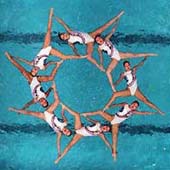 Seems to me we humans are changing in more profound ways than we might readily notice. Most of us are no longer living in the same kind of world. Seems to me we humans are changing in more profound ways than we might readily notice. Most of us are no longer living in the same kind of world.
Earlier, a few hundred years ago, or even 50 years ago, life was more simple and coherent. You have a certain job, and you manage life by doing what you're doing. If you were Joe the Blacksmith, your life was pretty much defined by what you did. It might have been hard and full of suffering and struggle, but it wasn't mental struggle. It was clear what you did, and what role you played, and it was continuous and coherent. You played that role all day. Even when you were off you were still Joe the Blacksmith. OK, closer to our own time, you might have several roles sequenced linearly. At work 9-5 you're Joe the Insurance Salesman, and when you get home you're Joe the Family Father. One thing at a time. All you need to do to do it well is to be present for it, and do the few tasks required of you.
If you live in the "developing" world, in an oldfashioned way, you might still be living your life being in the same role all the time. And you probably wouldn't be reading this. If you live in a westernized country, you might possibly have managed to stay in an arrangement where you focus fullheartedly on your job during the day, and then you go home to your family, and it is still simple and straightforward.
But more and more people are no longer living straightforward linear lives. What makes the difference is in part our communication technologies. We carry cell phones and beepers. We have e-mail, instant messengers. But it is also what we do mentally and emotionally. We increasingly live abstractly or virtually, interacting with stuff that isn't physically here.
I live in a house with some other people. There's plenty to do. I could work in the yard, clean up, read my books, relate with these other people. I could spend all my time doing that, and in the "oldfashioned" way of life, that's what I would be doing. It might have been a farm, and all my attention would be spent on the work and activities going on here in this physical space. But now, today, I spend maybe 10% of my energy on what is going on right here. The rest is scattered across a much larger space, both geographically and more abstractly.
I perceive myself as having a long list of obligations to people in various areas. I work for money for people in several places, and I almost never see them. They aren't here, yet I feel quite a pressure of doing things for them. Part of that work involves keeping an eye on a whole bunch of things that aren't here either. Servers, e-mails, relations to a whole bunch of other people I don't see.
I have shared projects with more people, just as scattered geographically. I have a more or less abstract relation to hundreds or thousands of people who either read what I write, or who use programs I've written, or who participate in spaces I've set up.
Much of this has similar characteristics and importances as activities I would previously have done right here. They represent jobs, callings, obligations, quests, friendships, community. But yet they're lacking the natural boundaries that previously would have regulated such things.
If I were living in a small village and I was doing physical work, there would be certain obvious natural boundaries. I can't work more than 24 hours per day. I can't have a conversation with much more than one person at a time. If I'm shoeing Jack's horse, it is obvious to everybody that I'm not doing all sorts of other things. If you come to my shop and I'm not there, then obviously I'm not there and you'll either wait for me, or come back another time.
But our virtual and abstract relationships don't easily respect such boundaries. They all tend towards consuming all time and space. They would, at least sub-consciously, tend to expect you to provide your full attention 24 hours per day. Which is becoming increasingly impossible.
I work for several different companies. They're mostly pleasant to work with, but they don't have much awareness of each other, so each will tend towards expecting me to work for them 24 hours per day. Oh, they'll wait a few minutes if I have another call, but they're never going to understand what else I'm doing.
Most people who call on the phone will expect me to answer and to actually be available to talk with them when I do. Most people who send me an e-mail will expect I have time to read it and answer it. Most people who come by will expect I have time to talk with them. My family expects that I'm always there, to have dinner, fix a boo-boo, or clean up in the garage.
Maybe I'm particularly bad at setting boundaries. But I doubt it is just me. I'm living at least a dozen lives. But yet I haven't been granted any more hours in the day. I'm being torn in many directions. My time is sliced up, juggling many different priorities and commitments, either at the same time, or in successive time slices.
It frequently makes me stressed, or confused. I'm not sure if I'm longing for simpler times, or I'm longing for a new evolutionary capacity of my brain, or if I'm just badly organized. Maybe all of the above.
In the "old" days it was easy to remember who you were, because the world didn't change very much. Everybody would remind you who you are, and if you simply did the work that appeared on your doorstep, life was simple. In our busy fragmented world, that's no longer any practical strategy.
Of the several directions of answers I see, one is to gain a much higher degree of awareness of who you are and how you do things. Not your title or your work or your obligations. But the specific quality you add to everything you do. Your brand. Maybe you haven't discovered it yet, and you need to. Maybe you kind of know, but it has been forgotten. But, one way or another, there's a need for finding who you are, separate from all the other stuff. Only then might you have a better chance of choosing what to get involved in, and what not. And there is a chance that you will actually do all of it in a consistent and coherent way, where you're actually in alignment with yourself, even though you're wearing many hats.
Another angle is to discover a different kind of awareness. A group awareness rather than an individual awareness. You're doing a whole bunch of things, in a whole bunch of different contexts. That is kind of like being a whole bunch of individuals. That can still work. You can be a swarm. An ant hill, a school of fish, or maybe rather a whole eco system. Many diverse pieces that relate with each other in a synergetic way. Instead of staying in the illusion that you're one person doing one thing, accept that you're now a movement of diverse pieces. The rules for a movement or an eco system are drastically different from the rules an individual might live by. A whole new volabulary to learn.
The world looks deceptively like it used to. The sun comes up in the morning, and you put clothes on, and eat, and gravity works like it always did. Yet, this is only a small portion of the world you live in now. You live many parallel lives. They need to learn to co-exist peacefully, if they don't already. Many independently moving pieces can very well exist in harmony, and a new kind of order can emerge.
[ Organization | 2003-05-04 03:26 | | PermaLink ] More >
|
|
| Monday, April 28, 2003 |  |
|
|
|
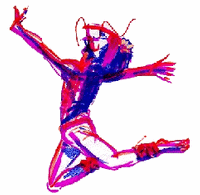 L.A.Times article (registration required) talks about multi-tasking and whether it is bad for you. Specifically it includes comments from a researcher who seems to think so. L.A.Times article (registration required) talks about multi-tasking and whether it is bad for you. Specifically it includes comments from a researcher who seems to think so. "Chronic multi-tasking over many years poses a strong risk for ultimate brain damage," says David E. Meyer, a cognitive neuroscientist at the University of Michigan. He is drawing on 30 years of laboratory research and published studies in the field.
Tension and confusion, those consequences wouldn't have surprised me. But brain damage?
Meyer explained: As we force ourselves to bounce from task to task and back again, we generate stress. Body and mind gear up to cope by releasing adrenaline and other hormones. This powerful medicine is good for a crisis, but hard on the machinery.[..]
Apart from brain damage and consequent depression, Meyer also noted the alarming likelihood that multi-taskers are losing the ability to concentrate. Hm, I don't know. There's something to that. As a wired-up human who's likely to always be doing a number of things at the same time, I do notice that I have a harder time concentrating when I actually need to. I have 4 instant messenger programs open. I get e-mail every 10 minutes. I have about 30 windows open on my computer. One of them is cable TV with 400 channels. I'm surfing the web. I have actual work to do. I have a lot of notes on my desk about things I need to remember. I have 3 phone lines. My family comes in and asks me things all the time. There's a stack of books I'm all reading at the same time. I feel stressed and scattered a lot of the time.
But I haven't quite decided whether multi-tasking in itself is good or bad. Whether we're evolving and learning to be continuously connected while in motion, or whether we should become more vigorous about carving out quiet concentrated space for ourselves.
My kids appear to have evolved compared to me. My 19 year old daughter seems to be perfectly comfortable chatting online with a dozen people simultaneously, while she's on the phone with somebody else, and she's listening to music and watching TV, and somebody's visiting. Doesn't look like stress at all.
I suspect there is a state of engaged synergy that is available, a being-in-the-flow, where you're doing many things at once, but they somehow work together and support each other. As a dance. As opposed to the frantic scramble of trying to do many things at once that really don't belong in the same space.
[ Organization | 2003-04-28 23:07 | | PermaLink ] More >
|
|
|
|
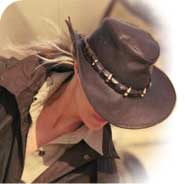 From HeadMap more freedom ants: From HeadMap more freedom ants:With the geo enabled foaf adhoc mesh internet in your pocket you should be able to turn a big piece of cheese into a hat no problem
broadcast your cheese, your location, and your need for a hat
..maybe money will come into the equation maybe not
..maybe you'll get a free hat and give away your cheese
..maybe you'll meet some friends of friends
the internet is a collaboration, exchange and transformation mechanism soon to have more cool features than money If our information network gets to be pervasive enough, the need for oldfashioned money will decrease. Money was a solution to the problem of not being able to find somebody who wants what you have at the same time as finding something you want to have. It was also a solution to the problem that we didn't trust that we could always find available that which we want. What we need is better information. Because most of what we want is quite readily available, if we just know where and how.
[ Organization | 2003-04-28 16:17 | | PermaLink ] More >
|
|
| Friday, April 25, 2003 |  |
|
|
|
 From Anne Herbert, Works of Frith: From Anne Herbert, Works of Frith:Carol said, "The name of my band is 'Failure to Disperse.'"
Which is the very activity we are called to right now. Some of the most important work to do now is to fail to disperse and to remind others to fail.
People with microphones who may be more interested in their own interests than in ours are strongly recommending that we disperse.
Suggestions popular now include being scared of the group or groups du jour--gays like me, immigrants like the family I come from, people in other countries we haven't met, poor people, people who aren't pale or aren't suit-bound or both, people who don't live inside.
Be scared of them, miss any connection you might have with them.
Disperse.
If you're in one of the recommended icky groups, be more scared of everyone else.
Disperse.
Also suggested to you by those who want to control you:
Watch lots of TV. Inside, in your own place. So what you mainly know about other groups is what people who plan to profit from your fear tell you to make you scared.
Stay in your car. See other people as good or bad drivers, in your way or not. Don't see their faces and possibly, in their faces, their story. Keep your face behind a windshield so they won't see your face and your story.
Stare at screens. Don't have very many times and places to look at people.
Disperse. Be alone with whatever manipulative info is coming at you through screens. Spend less and less time being in your own physical situation with your own body and your own impressions. Disperse; break < up the connection with your own physical life.
Watch TV and say how stupid it is. That's fine. Just as long as you watch it. Using your intelligence to say that TV is stupid is not really having a very strong connection with your own intelligence.
In fact, it is dispersing from the great new stuff you'd come up with to do if you applied your intelligence to the situation you yourself are actually in. If you came up with great new stuff, you might not follow orders from leaders, so please do watch TV and get off on knowing it's stupid. Indeed. That is one of the strongest messages being broadcast to you in the ethers. Disperse. The world is a disconnected, random and dangerous place. So, disperse and be separate, afraid and disorganized like everybody else. Well, it is a lie. A lie that allows those who are better organized and informed than the rest of us to get the upper hand. The main thing to do to change the tide is to fail to disperse. Connect. Communicate. Organize. Gather a collective picture of what is really going on. Act accordingly.
[ Organization | 2003-04-25 18:59 | | PermaLink ] More >
|
|
| Wednesday, April 23, 2003 |  |
|
|
|
 From HeadMap: From HeadMap:money was predicated on spatial constraints
the range of currencies is infinite and the money is intermediary between them
hats are currency, butter is currency,
they get filtered through money (so that ..hats can buy butter at another place and time)
the friction that transportation and distribution and communication among those who would exchange created the right climate for money
the internet is doing some disturbing things
it is creating currencies and ecoonomies with no money intermediary
link economies, peer two peer file sharing economies and software development and exchange economies
this seems to suggest that in the absence of friction money makes less and less sense
in fact in the current climate many things are starting to make less and less sense
and these network economic anomalies will soon slip into the real world
destroying huge industries based on friction difficulty seperateness and centralisation
as exchange without money becomes more efficient and reliable
money won't disappear but will have to start living in parallel with vibrant, aggressive efficient parallel economic forces
the moves towards hardware level copyright controls and crippling copyright legislation
seem more and more like attempts to artificially introduce friction into a system that by its nature is able to remove it entirely
there seems to be the fear that money itself may be on the verge of collapse and that only a radical lockdown can save a civilisation with money at its heart
capitalism is being augmented at a frightening speed
[ Organization | 2003-04-23 23:13 | | PermaLink ] More >
|
|
| Monday, April 14, 2003 |  |
|
|
|
Tim Berners-Lee, creator of the World Wide Web, says in his book Weaving the Web:"We ought to be able not only to find any kind of document on the Web, but also to create any kind of document, easily. We should be able not only to follow links, but to create them - between all sorts of media. We should be able not only to interact with other people, but to create with other people. Interactivity is the process of making things or solving problems together. If interactivity is not just sitting ther passively in front of a display screen, then interactivity is not just sitting there in front of something 'interactive'." To which Sebastian Fiedler says:"So, why is nobody in the eLearning realm reading Tim Berners-Lee? How come that so many people see the Web mostly as a large distribution and retrieval system? They see designers, creators, domain experts, etc., on one side ... and loads of consumers on the other. Hm... if I think about it... that last sentence reminds me somewhat of schools..." Yeah, if instead we can figure out how to trigger rampant creativity and spontaneous cooperation - that would be something. Life is too short to leave the design of it to an elite.
[ Organization | 2003-04-14 20:44 | | PermaLink ] More >
|
|
| Sunday, April 13, 2003 |  |
|
|
|
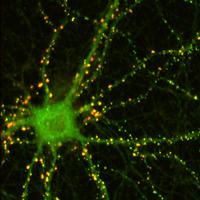 L'oeil de Mouche comments (in French) on weblogs working like neurons. A weblog links with other sites in a similar fashion as a neuron does. The links are potentials for action. Something might or might not come out of them. They might or might not be followed. They might or might not add up to any coherent picture of anything. All the incoming data to a neuron do not necessarily add up to that neuron producing an outgoing signal. But if the sum of the incoming potentials cross a certain threshold, a new outgoing signal is generated. L'oeil de Mouche comments (in French) on weblogs working like neurons. A weblog links with other sites in a similar fashion as a neuron does. The links are potentials for action. Something might or might not come out of them. They might or might not be followed. They might or might not add up to any coherent picture of anything. All the incoming data to a neuron do not necessarily add up to that neuron producing an outgoing signal. But if the sum of the incoming potentials cross a certain threshold, a new outgoing signal is generated.
If several neurons are in sync, suddenly their signal starts being detectable. Multiple weblogs focusing on the same matter adds up to a noticable resonance - a synergy. That is like the concept of 'synaptic plasticity'. Hebb's learning postulate says essentially:Whenever neuron A fires, and neuron B fires soon afterwards, the synaptic efficacy increases. So, if two neurons are active at roughly the same time, the connection between them is strengthened.
Likewise, if several weblogs happen to be focusing on the same subject at roughly the same time, the connections between them get strengthened. For that matter, it generally works like that between people. If you and I often happen to be activated in a certain way at the same time, like being interested in the same subject at the same time, or having similar experiences, and we notice that, chances are we'll have a stronger link between us in the future. It will be more likely that I'll check in with you before others who have less of a history of being in sync with me.
But, indeed, in the human body the neurons are part of an organism with a common purpose, of making that organism function well. Whereas weblogs and people having chance encounters do not have a pre-defined common purpose. The connections perhaps serve to discover shared purposes, rather than just carrying out existing purposes more efficiently?
[ Organization | 2003-04-13 16:00 | | PermaLink ] More >
|
|
| Thursday, April 10, 2003 |  |
|
|
|
 Elisabet Sahtouris speaks lucidly about how life works, how evolution works, and how we can learn great lessons from the intelligence of nature. Here's from a small article on the Evolution of Governance: Elisabet Sahtouris speaks lucidly about how life works, how evolution works, and how we can learn great lessons from the intelligence of nature. Here's from a small article on the Evolution of Governance:"In studying the Earth's evolution, the most fascinating story I know is that of ancient beings who created an incredibly complex lifestyle, rife with technological successes such as electric motors, nuclear energy, DNA recombination and worldwide information systems. They also produced - and solved - devastating environmental and social crises and provided a wealth of lessons we would do well to consider." That was two billion years ago, mind you. And we're not talking about extra-terrestrials, we're talking about our earthly ancestors, one celled microbes. Despite literally having no brains, they faced crisises very similar in structure to what we face today, and they developed peaceful synergetic solutions."Their crisis came about when food supplies were exhausted and relatively hi-tech respiring bacteria ("breathers" with electric motor drives) invaded larger more passive fermenting bacteria ("bubblers") to eat their insides out - a process I have called bacterial colonialism or imperialism. The invaders multiplied within these colonies until their resources were exhausted and all parties died. No doubt this happened countless times before they learned cooperation.
Somewhere along the line, the bloated bags of bacteria also included photosynthesizers, "bluegreens," which could replenish food supplies if the motoring breathers would push the enterprise up toward a lighter part of the primeval sea. Perhaps it was this lifesaving use of solar energy that initiated the shift to cooperation.
In any case, bubblers, bluegreens, and breathers eventually contributed their unique capabilities to the common task of building a workable society. In time, each donated some of their "personal" DNA to the central resource library and information hub that became the nucleus of their collective enterprise: the huge (by bacterial standards) nucleated cells of which our own bodies and those of all Earth beings other than bacteria are composed.
This process of uniting disparate and competitive entities into a cooperative whole was repeated when nucleated cells aggregated into multi-celled creatures. Once these biological "governments" evolved, they continued to function beautifully. What nature's healthy bodies and ecosystems exemplify are beautifully unified democracies of diversity, organized by locally productive and mutually cooperative "bioregions," and coordinated by a centralized service government. The underlying and overriding motive is toward healthy production and consumption for all." And, if it isn't already clear, your body is one of the results. A democratic cooperative society of billions of individual beings.
Now, the question is, do you really want to come across as being more stupid than the bacteria in your intestines? It would be a bit embarrassing if we big complex beings with huge brains couldn't even figure out how to organize ourselves in a viable manner. If we're really stupider than the parts we're made of. Particularly when a several billion year unbroken succession of our ancestors has succeeded inpeccably until now.
[ Organization | 2003-04-10 16:02 | | PermaLink ] More >
|
|
|
|
 What is emergent direct democracy? It is just many people being free to make choices, and the aggregate result of that, and the hope that the result can be fairly coherent. What is emergent direct democracy? It is just many people being free to make choices, and the aggregate result of that, and the hope that the result can be fairly coherent.
Democracy is that the people decide things - that they choose what they want. In most countries in the world, that has been reduced to a ritual of every few years letting the people choose among some candidates, and the individuals they elect will then make most of the big important choices for the following years. If that is at all worthy of being called 'democracy', it certainly isn't direct democracy, and there isn't either anything very emergent about it. Yes, if the people really, really, really want things to be different, and they manage to mostly agree on that, they can start a revolution of some kind, elect somebody different from what they're offered, or force the ground rules to be changed. But there's a very high threshold to that, and it is mostly avoided by keeping people dispersed, busy, but moderately content.
Now, what would be all different would be if the democracy really consisted of all of us making choices, all the time. Not one choice per four years, but probably several or many choices per day.
[ Organization | 2003-04-10 12:07 | | PermaLink ] More >
|
|
<< Newer stories Page: 1 2 3 4 5 6 7 8 Older stories >> |

